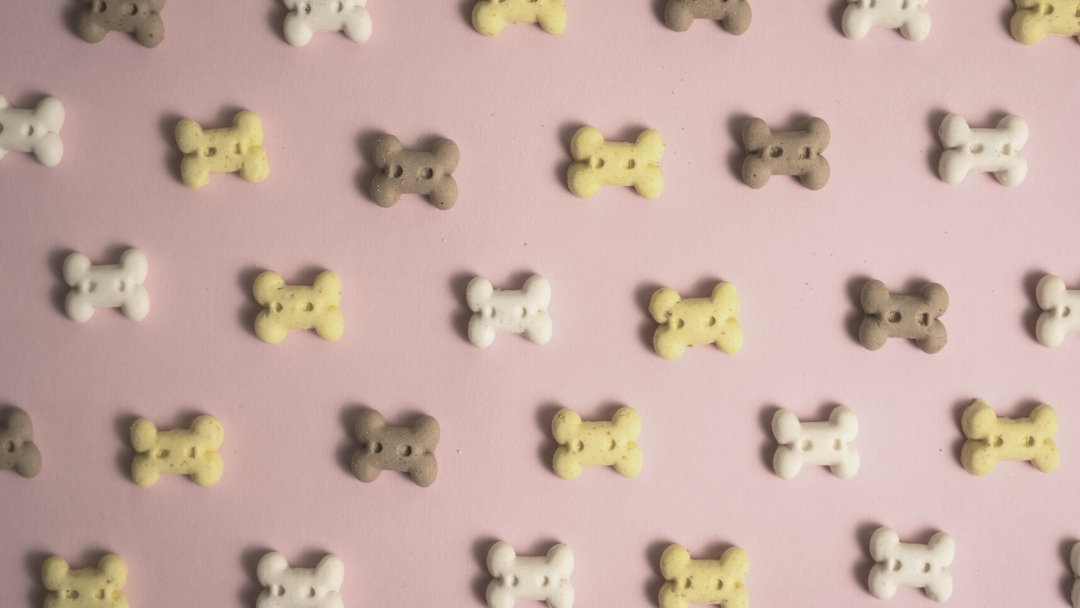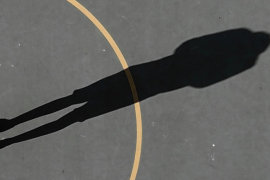ROSCOE LIVES ALONE WITH THIRTY-FIVE DOGS. He finds them easy to take care of, even though he’s seventy and slowing down. The dogs require little but that he calls out their names a few times a day, that they are free to roam anywhere in the house, they can sleep wherever they choose, and that if they fight with one another Roscoe will allow them to work it out amongst themselves.
They are easy to take care of because they are dead. Roscoe lives a small fistful of miles from Shelby Animal Control on I-22. He drives out there, when he feels like it. He doesn’t go inside. The woman who he assumes runs the place is usually standing outside with a cigarette. She is thin. He is intimidated by her, but no matter. He doesn’t need to go inside to find the spirits of the animals murdered at this high-kill shelter. The spirits are everywhere.
“What do you think, Wispy?” he says to his newest addition, a seventy-pound female hound mix with a spot of hot pink on her nose. “What do you think of the house?” He’s decided to name this new girl Wispy because it makes him think of touching something.
Roscoe feels in his pocket for his house key, his fingers coming instead upon a small screw he found this morning in the bedroom upstairs. He kept the screw because he didn’t know if it came from something important. When he can, he wants to figure out where it belongs.
He finds his key and wonders: What will Wispy want to smell first? The couch? The spot on the rug where Roscoe thinks Danny the Doberman takes an occasional whizz? He opens the door.
Margo. Elmer. Sunshine. Pee Wee. Everyone meet Wispy. Oh, you too, Milkshakes. Good boy. The dogs swirl around him, making terrific sounds. Wispy is welcomed, and wants to smell the kitchen garbage can.
Roscoe hangs his jacket on one of the hooks behind the door. A lot of hooks for just one jacket. He has another jacket somewhere. The lining is ripped maybe, he never got it fixed. He should find it, he thinks, hang it by the door here. Two jackets. One to keep the other company.
His life, such as it is, is rich in dreams like these.
By the time he turns around, Pee Wee, Margo, Milkshakes, Wispy—all of them have disappeared up the stairs. “Wispy?” he calls out. Wispy hasn’t had time to learn her name yet, so she doesn’t respond. In truth, almost none of them comes when he calls, even after they’ve learned their names.
Except for Sunshine. Sunshine always comes when he calls her. “Good girl,” he says. She used to greet him by throwing herself upward to land her front paws on his chest. She can’t do that any more. Nevertheless she is ready for some attention. They wrestle a bit. At sixty-five pounds she’s not a small dog, and at seventy he’s not a nimble man. But he’s sturdy enough for Sunshine, who knows how much he can take. “Okay, that’s enough,” he says. She follows as he pads toward the kitchen. “Good girl.” He’s said those words so many times they should have lost all meaning. That happened once, when he was around eight or nine: he said the word “bookshelf” to himself, out loud, over and over, hundreds, thousands of times, until the word took on an abstract existence unrelated to having ever represented anything.
Roscoe wanders over to the fridge. He has a few drinks to look forward to. The fridge begins to sing when he opens it, a song that doesn’t make sense to Roscoe: a song about the past, it’s always a song about the past, never the future. Why would an old fridge sing about the future? The future is a garbage heap. He shuts it. It hisses, suggesting that when this is over and it’s time for the garbage heap at long last, it really won’t object, much.
Roscoe isn’t ready. Not while there’s still something to drink. He’s counted the beers in his fridge: four regular, six light. His doctor wants him to lose weight. And eat more nuts. I did that last night, he thinks. I don’t have to do that every day, do I? He belches. He should find a new doctor. His current doctor is the only one left for him to displease. With Karen gone, that is. She liked to talk. For forty-two years that woman talked. She talked less as things wore on, but he can still remember how she could run at the mouth like a faucet.
Sunshine barks from the other room. Coming, Sunshine. These are his favorite times of what’s left of the day, sitting on the couch with Sunshine and a beer.
He wants something for his eyes to focus on, distract. He picks up an old Dispatchoff the table, takes another beer, so he won’t have to get up again when he’s ready for it, and shuffles to a familiar spot on the couch. It takes his weight, the vinyl cushions breathing a stale, irritated air into the room through their zippered mouths.
A few minutes of the evening already knocked off. First beer half gone, second within reach. His favorite dog by his side. Where’s Wispy, that new one? The one he got because he was worried Elmer and Pee Wee weren’t getting along, and Milkshakes needed a new playmate?
He scrunches his nose. Danny the Doberman is definitely whizzing on the rug.
On to the Dispatch. Big stories already read. Comics, too. Horoscope, advice, personal ads…
Ah, the personals. His favorite. Windows into other people’s psyches! He saw one couple days ago where some woman “not yet past her prime,” widowed, or maybe she was divorced, with 11 (or maybe it was 12) beautiful grandchildren, looking for intellectual companionship and a modest amount of sexual ecstasy, mature men only, 55-80. Or some such age range. He kicks off his shoes, puts his feet on the coffee table (Karen would be furious if she were here) and turns his attention to Weird But True. The beers are beginning to take effect. “Weird but true,” he says, raising an eyebrow, an anticipatory gesture. Weird But True: 10-year-old girl wins World Worm-Charming Championship. Italian woman discovers she’s pregnant with the wrong baby. Drunk vandals key their own car. (Ha!) Seeing-eye dog walks into traffic, kills owner.
He looks over at Sunshine, curled up and looking like nothing so much as an iced cinnamon bun. He reaches over and rubs her between the ears. “I could eat you up!” he says. Sunshine wags her tail, as if nothing would please her more.
The paper says the blind guy was killed in front of an animal hospital. He stops to consider that. Karen lost her eyesight in her last six months. Some beetles can carry 850 times their own weight.
He stands, stretches, and scratches his naked scalp. The paper doesn’t have anything more that’s weird but true. Except the headlines! He makes his way back to the kitchen, knowing Sunshine, with her one good eye, is watching him.
There’s something about a dog, he thinks, not just how happy they are, not just the unconditional love part (though both are special), but the simple idea that you’ll likely outlive the creature. Dogs: they have a beginning, a middle, an end. They tell a complete story. If you outlive your children it’s considered tragic. But you could outlive your dog. You’re supposed to. It’s not that you want to but it’s okay if you do.
They had no children. They’d talked about it in the first few years, then it came up less frequently. The last time Roscoe brought it up, one night in bed while they were watching TV, Karen didn’t say anything at all.
You could outlive your spouse, if you had to, he thinks. One of you had to. Unless you both went down in the same plane.
“You know why we outlive our dogs?” Roscoe says, perhaps explaining things to the fridge. “Dogs clear a path to Paradise.” He pulls out another beer as he continues the thought in silence: They wait for you there. They make lists of your allergies, your pet peeves, your favorite brands of foods. Everyone there practically knows you already. “Cuz they know your dog,” he mumbles, not really meaning to say the last part out loud. The blind guy would have to do all that on his own. No help from his dog.
Karen, if she made it to the other side, is probably telling everyone he let the lawn go brown, or that he snores, especially if he’s been drinking. Karen probably doesn’t even remember what he’s allergic to. Actually, right now he can’t remember what he’s allergic to. There’s something, isn’t there… Makes him break out in a rash. No, makes him itch. Or maybe it was Dad who was allergic to something. He’d assumed he’d outlive Dad, but no one, least of all he, expected him to outlive Karen.
He flicks off the kitchen light and feels his way along the wall to the living room. There you are! he hears himself say, either to Sunshine or to his beer on the table. He sits down on top the Dispatch, crushing all the stories weird but true. The paper makes a dissatisfied sound as it surrenders its neat folds to the rounded contours of his ass. Stay off of Elmer’s side, he silently commands Wispy. Elmer won’t like you if you take her side of the bed! He’d check to see if they’re okay, but the stairs, with the lime-green carpeting, look so uninviting. And he doesn’t really want to see the bed. Worst part of the day, looking at that bed, with the quilt with the big flowers that match almost exactly the flowers on the curtains. Hate that quilt. Hate those curtains! Tomorrow he’ll set those curtains on fire.
He looks at his hands and can’t imagine why he’s holding two beers. He shrugs, finishes one, making a mental note to smash the bottle on the driveway. “Crash!” Sunshine stirs, and cocks her head.
Karen never really took to Sunshine. Sunshine was his. That was obvious the moment he brought Sunshine home. He got her when Karen came home from rehab, that first time. Sunshine was a puppy then. A puppy was supposed to bring life into the house. A puppy was supposed to make Karen and Roscoe forget about that difficult year. Sunshine couldn’t fix that. Instead, a puppy seemed to remind Karen that the only reason it was there was to change the subject. All the times Roscoe encouraged Karen to walk with them went ignored. Sunshine and Roscoe walked alone.
Then Karen was gone. After the few relatives and neighbors left, it was just Roscoe and Sunshine. Sunshine didn’t seem to mind. Roscoe didn’t always mind either. Sunshine took good care of him, and he took care of her.
It was after even Sunshine was no more that he started inviting the others.
Pee Wee. Milkshakes. Margo. Elmer. At first he just drove to Shelby Animal Control, at night, when he knew they’d be closed, parked in the front and listened. All that barking! How many animals would spend their whole lives here? And how many of them would have nowhere to go, even after they’d been put down? The place—it must be filled with spirits. He wanted to take them all home.
And so, one by one, he did. All the doomed spirits at Shelby Animal Control. Nan, Tucker, Oedipus, Press, Gracie, Sportsman, Kinbud, Soldier, Jellyroll. Wasn’t there one named Beetle? Big guy, chocolate brown. Another he called Socks, until a few weeks ago when Socks seemed more like a Ginger, so he called her that, and Ginger didn’t seem to mind. Now Wispy, with her white legs and regal gaze.
He can feel Sunshine’s balmy breath on his cheek. He can feel it if he wants to.
It’s occurred to him that perhaps not all of the spirits he collects come from an animal shelter. Margo’s bark sometimes sounds like a human cry. What was that place before it was a kill shelter? A prison? A check-cashing store?
He looks at the wallpaper. Who picked that pattern, he wonders. Perhaps it came with the house.
Death is just life stripped of our ability to feel pain. We remember the pain but we can’t feel it. And life is death stripped of our ability to understand it. He read that somewhere. Or maybe he just now made it up.
He reaches for Sunshine, where he thinks he remembers she is.
JEFF BOND’s stories have been published in the Carolina Quarterly, Fatal Flaw, McSweeney’s Internet Tendency, and The New Engagement. He lives in New York City, where he has for many years been a staple of Manhattan daylife as a Happy Hour bartender. He also creates and edits video, which can be found on his website, jeffbond.nyc. He is currently working on a novel.
Like what you’re reading?
Get new stories or poetry sent to your inbox. Drop your email below to start >>>
OR grab a print issue
Stories, poems and essays in a beautifully designed magazine you can hold in your hands.
GO TO ISSUESNEW book release
China Blue by Catherine Gammon. Order the book of which William Lychack Jeffries calls “a fiery declaration of all that is inexpressible about desire and loss and the need to find a home in a world in which even the most solid and real of things feel often less than completely solid or real.”
GET THE BOOK



